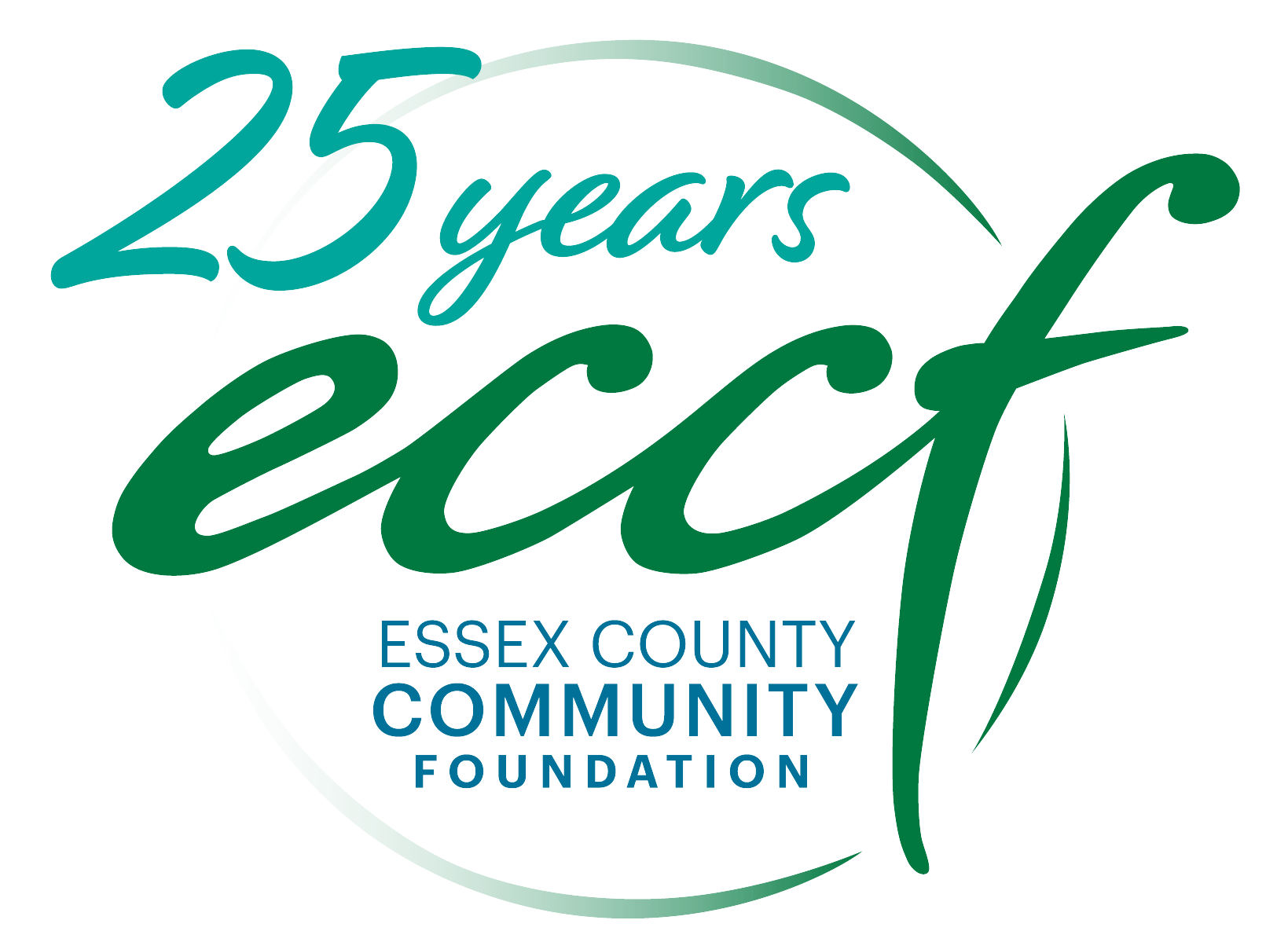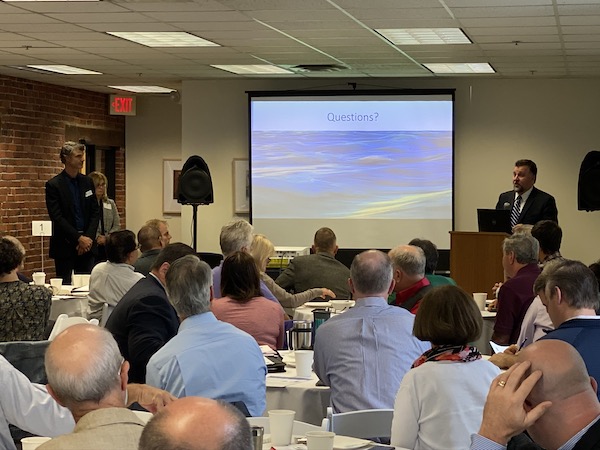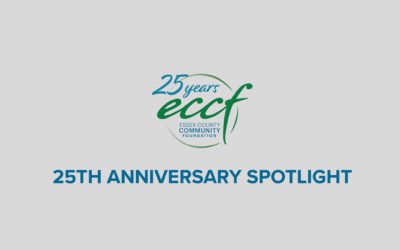Gloucester, MA – Outside 33 Commercial Street in Gloucester, gray skies hang over Harbor Cove, where the sounds of a bustling luxury hotel next door and the smell of fish linger in the air. The cove, alive with activity, is home to many businesses that rely on the sea.
“Businesses say, ‘We are here because of that,’” said Michael Goodman, executive director of the Public Policy Center at UMass Dartmouth, as he points towards the large windows that overlook the choppy waters. “They tell us, ‘don’t screw up the ocean.’”
On Oct. 2, Goodman presented research data backing up just how much Gloucester, and many other North Shore coastal communities, relies on a healthy ocean for economic security. And more than 75 community and business leaders, nonprofits, investors and philanthropists – gathered by Essex County Community Foundation (ECCF) and the University of Massachusetts for ECCF’s first-ever Essex County Think Lab – were there to learn about a new initiative focused on sustaining and growing the North Shore’s blue economy.
Goodman and his colleagues at UMass Dartmouth have been tapped by partner, Dr. Katie Kahl, assistant extension professor of sustainable fisheries and coastal resilience at the UMass Amherst Gloucester Marine Station, to help build the foundation for the creation of a North Shore Blue Economy Collaborative, which would develop a regional, sustainable economic development strategy to build on the region’s strengths and capitalize on new and emerging opportunities in the Blue Economy.
“The North Shore Blue Economy initiative is an exciting opportunity to bring together the diverse perspectives of community leaders, businesses, and research institutions to focus a path toward sustainable economic development on the North Shore,” said Kahl. “That means maintaining our maritime heritage and regional culture while creating jobs connected to the health of our ocean and coasts.”
ECCF, a local charitable foundation serving the 34 cities and towns of Essex County, partnered with the UMass Gloucester Marine Station and many other organizations – including the Cape Ann Chamber of Commerce, Gloucester Economic Development and Industrial Corporation, the City of Gloucester, North Shore InnoVentures and the North Shore Tech Council – to convene the Think Lab. A facet of the Foundation’s Impact Essex County Empowering Economic Opportunity (EEO), the Blue Economy Think Lab was the first of four such convenings to be held over the next six months. Future topics include opportunity zones and the living wage.
“We envision Think Labs as the space and place where knowledge can be shared, coalitions are built and where the next great ideas can incubate,” said Stratton Lloyd, ECCF’s COO and vice president for community leadership.
The Blue Economy
The Blue Economy is defined by the World Bank as “the sustainable use of ocean resources for economic growth, improved livelihoods and jobs, and ocean ecosystem health.”
[Blue Economy industries include: living resources, marine construction, offshore minerals, ship and boatbuilding and repair, tourism and recreation and marine transportation.]
It accounts for 11 percent of jobs in core North Shore coastal communities, the majority of which are in Marine Tourism and Recreation and Marine Living Resources, two sectors that the North Shore is over three times more specialized, and consequently more dependent upon, than the nation. It is estimated that over 6,500 blue economy jobs can be found in Gloucester, Salem and Beverly alone.
And while ocean-reliant industries also account for $6.4 billion in gross state product and have outpaced other statewide industries in job growth by 9.8 percent, Goodman says, “It’s a sector that’s under pressure.”
But threats to the Blue Economy like climate change, ocean pollution, depleting fish stocks and others also present opportunities to innovate and grow.
“I think the Blue Economy, quite clearly, is a central and integral part of the Massachusetts economy if we play our cards right,” said Goodman, who co-authored a statewide study commissioned by the Seaport Economic Council in 2017 and will be wrapping up an analysis of Southeastern Massachusetts this fall.
The North Shore Blue Economy Initiative is a powerful step for our region, one that Massachusetts Secretary of Housing and Economic Development Mike Kennealy – who delivered the opening address on Oct. 2 – called “music to our ears at Team Baker.” Since 2015, the state has invested $41 million in 87 projects to improve infrastructure in coastal communities across Massachusetts.
“We remain committed to funding for Massachusetts seaside communities,” said Kennealy, who added that while the Blue Economy in Massachusetts is strong – with a total statewide economic impact of more $17 billion – it has lacked a comprehensive regional strategy.
“This Phase I assessment will help the UMass Amherst Gloucester Marine Station shape a research platform that informs sustainable, regional decision-making,” said Kahl. “There are multiple sectors involved here, which will be most successful when they all work together.”
Collaboration, cross-sector partnerships and regional convening are vital aspects of ECCF’s systems approach to increasing economic opportunities for residents across the region.
“The local Blue Economy is clearly critical to the economic stability of the North Shore, but it also has so much potential just waiting to be tapped,” said Lloyd. “ECCF’s role here is to amplify the incredible work already happening to bolster the Blue Economy by putting all of these great minds together in one room and engaging them in a discussion about collaborative strategies for regional economic development.”
Gathered in small groups, participants in the Oct. 2 Think Lab discussed the North Shore’s strengths and challenges. They also offered their visions – presented as newspaper headlines – for the future of the local blue economy.
“Innovation, Supported by Tradition as the Blue Economy Takes off on the North Shore,” was one hopeful headline that drew unanimous approval.
A comprehensive report, including the full economic analysis by researchers and data culled from the Think Lab, will be released this winter. The launch of the next phase of the Initiative is expected in the spring of 2020.
View Michael Goodman’s full presentation HERE.
For more information about the UMass Amherst Gloucester Marine Station, visit umass.edu/ses/gloucester-marine-station.



